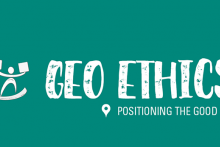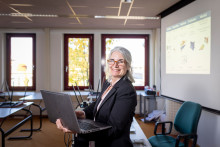The event was a collaboration between the Faculty of Geo-Information Science and Earth Observation (ITC) and the Faculty of Behavioral, Management and Social Sciences (BMS) of the UT.Experts from within and outside of the university took the stage to stress the importance of geo-ethics in today´s world, where information about our lives is regularly collected in many ways, such as through social media, mobile phones, cameras, or satellites.
'Different scientific fields raise different ethical issues,' began Philip Brey, professor of Philosophy of Technology from the UT and the first speaker of the day. 'Social sciences focus on the relation between the researcher and the social subject. Ethical issues within the information sciences mainly relate to the responsibility of processing, storing and dissemination of data, and so on. Geosciences combine ethical issues of many fields - natural, social, engineering, and information sciences.'
Inaccurate maps can lead to military mistakes
According to Professor Brey, ethical issues in visual representation of geo-information (maps) mainly fall into the categories of inaccurate representation, biased representation and representation of sensitive data: 'Inaccurate representation can have severe consequences, such as military mistakes, unpreparedness for disasters or car accidents - like in cases when a road is not shown accurately on a map. We therefore have social responsibility for accuracy. However, the accuracy depends on the purpose of the representation. For instance, small cities are not depicted on some maps, because it would crowd the map.'
Biased representation is another important ethical issue that mapmakers need to take into account. 'An example of biased representation is selective including or excluding of information, such as South African apartheid map that doesn´t depict black townships. This topic also involves representations that are more useful for some groups than others, for instance a map with up-to-date information about car roads, but not bike paths,' explained Brey.
Do we have the right to land privacy?
Many people are worried about their privacy, and so depicting of sensitive data is something that geo-information scientists also need to consider. 'You might have to decide which data needs to be left out because of privacy. Private organizations and governments might not want their facilities depicted on maps, but do they have the right for that? And to what extent?' pointed out Professor Brey. 'It´s important to remember that sciences don´t only objectively represent the external world, but they also intervene and try to make the world better, and we have to recognize this intervention.'







